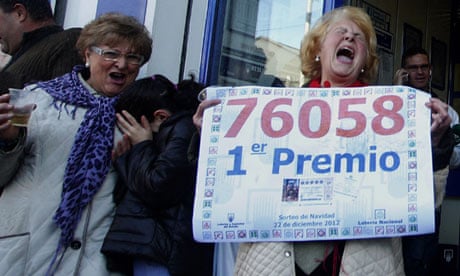Spaniards facing yet another year of economic misery found relief in the world's biggest lottery payout on Saturday, the traditional Christmas Gordo, or Fat One, which spread €2bn in prize money around the country.
Champagne corks popped in towns, cities and villages across Spain as tens of thousands of winners took home enough money to keep their families going through the dark days of 2013 and beyond.
"Yesterday we were both on the dole, but today we are winners," said one happy couple who danced in front of television cameras in Alcalá de Henares, a university town 20 miles from Madrid, after collecting €400,000.
That was the prize handed out to each of the 1,800 people who bought shares known as décimos – priced at €20 each – in the winning lottery number. Most lived in a working-class neighbourhood of the town though the winning number 76058 was sold in 40 places around the country.
One family walked away with €4m after Antonio Ortega Sánchez bought a total of 10 winning décimos and gave them away to his children and siblings. "My dad, brother and uncle have all got tickets as well," said his daughter. "I'll be buying a decent house and a car."
First held in 1812, the Christmas lottery has become a tradition with Spaniards spending an average of more than €70 a head on it. That amounts to almost €3bn, with around two-thirds handed back in prizes that vary from 20,000 times the original bet to simply getting money back.
The rest is held on to by the state lottery fund to cover costs and boost Spain's exchequer – with sales income from the Gordo reducing the country's deficit by the equivalent of 0.1% of GDP. Spaniards are glued to television sets, radio and the internet every 22 December as the lottery numbers are picked out at a Madrid theatre by schoolchildren.
This year, however, the event was interrupted by workers from the publicly owned Madrid regional television station Telemadrid – where some 900 people face the sack in 2013. Other protesters at the event complained about the health cuts that form part of prime minister Mariano Rajoy's austerity measures as Spain struggles with recession, 26% unemployment and fast-growing debt.
This is the last year that Gordo winners can enjoy their money tax-free. The government is imposing a new tax on winnings of more than €2,000 next year. It has also tried to privatise the state lottery – which holds weekly draws but earns half of its income on the Gordo – but eventually decided it could generate more income by keeping it in public hands.
Superstitious Spaniards had this year sought numbers coinciding with everything from the supposed Mayan date for the end of the world to the day on which an elderly, amateur art restorer called Cecilia Jiménez became world famous with her botched restoration of the Ecce Homo painting at a church in Borja, central Spain.
